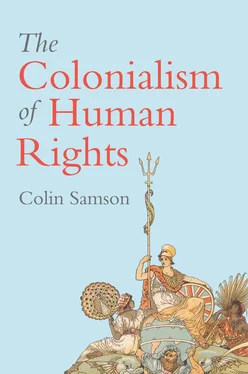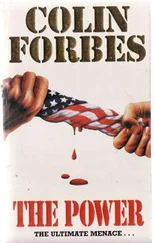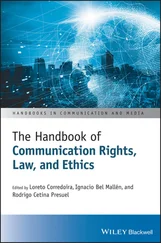1 ...6 7 8 10 11 12 ...15 Colonizing and enslaving shaped these exclusions since they were underpinned by ideologies emphasizing cultural hierarchy. This was expressed in the use of the trope ‘civilization’, which connoted an opposition to be overcome in the barbaric or savage. For Immanuel Kant, if a territory lacks ‘rudimentary modern legal and commercial institutions and a centralized coercive authority’, it is a threat to civilized states, which have a right to impose order upon the peoples of the territory to set them on the path of modernization. 36That may mean, as it often did under colonialism, not permitting such peoples equivalent rights to those who considered themselves civilized. Within this foundational liberal ideology, the human rights of non-European peoples under European dominion were often constituted as rights to be ‘modernized’, and therefore these peoples were denied some of the liberal ‘universal’ rights articulated by Enlightenment philosophers. The British Empire, for example, incorporated Asian, African and indigenous American peoples into its political and legal order with complex differentiations of rights according to caste, religion and tribe. 37
Britain’s enslaved Africans in the Caribbean and elsewhere, of course, had no such citizenship rights, and the terms of the abolition of slavery dramatically illustrated how rights and privileges were mapped onto ways of thinking about human beings through hierarchy. Despite abolitionist voices, Britain did its utmost to preserve slavery. It was ‘the settled policy of England to encourage the slave trade’. 38The British Parliament intervened to prevent attempts to prohibit slavery or limit the importing of enslaved people in its North American and Caribbean colonies in the eighteenth century. 39After Britain eventually abolished slavery in its colonies, in 1834 a sum of £20 million, equal to anywhere between £2.57 billion and £76 billion in 2010, 40was set aside to compensate proprietors of enslaved people through a loan from the City of London that was only paid off in 2015. At the time, there was ‘a feeding frenzy amongst members of the British elite over the compensation money, a frenzy which drew thousands of Britons into asserting their ownership of slaves once the state attached specific and immediate monetary value to the claims of ownership’. 41
By contrast, as Nicholas Draper shows in his analysis of documents relating to the Compensation Commission set up to disburse the monies, 42neither reparation nor human agency was attached to those enslaved by the British on their Caribbean plantations. Under the Act abolishing slavery, freed people were required to work as unpaid labourers or ‘apprentices’ for four to six years. 43The compensation to slave holders and investors in slavery has helped perpetuate privilege and luxury in Britain and elsewhere for the generations of descendants of British enslavers. Including widows, clergymen and many shareholders with financial, trading and other relationships with slavery, those who were compensated for the loss of their property have continued to use this and other monies from slavery to amass wealth, power and advantage. The same is true for various institutions in British society documented by the Legacies of British Slave Ownership project at University College London. 44Hence, current social and racial hierarchies in Britain are tangibly related to slavery and to the British government’s massive rewards to owners of human property.
As this illustrates, hierarchical access to social, political and economic rights was deeply ingrained in British political culture. Similar hierarchies were embedded in the premises of nineteenth-century British thinkers, especially the Utilitarians, whose thought is another important source of liberalism. While advocating constitutional representative government, equality under the law, and freedom of thought, speech and conscience – with only the prominent exception of Jeremy Bentham – they simultaneously provided important sources of guidance for British colonial administration, especially of India. Their support for colonialism meant that these thinkers had to make and justify exceptions to liberal principles. The justifications sprang from the a priori position that Europeans in general were superior peoples, and, by the same token, non-Europeans possessed an inferiority often characterized as uncivilized or barbaric. Following the observations of colonial administrators, prominently including the jurist and historian Sir Henry Maine, 45the idea that non-Europeans were fixed in a prior state of human development became part of the guiding assumptions of liberalism.
Stokes opens his history of Utilitarian thought on India by observing that ‘the physical and mental distance separating East and West was to be annihilated by the discoveries of science, by commercial intercourse, and by transplanting the genius of English laws and English education’. 46To achieve this, James Mill, and his son John Stuart Mill – who spent thirty-five years as a British East India Company official – believed that authoritarian rule would be needed to transform Indians culturally if liberal democracy were to be successful. In 1859 in his introduction to ‘On Liberty’, John Stuart Mill proclaimed:
To characterize any conduct whatever towards a barbarous people as a violation of the law of nations only shows that he who speaks has never considered the subject … Barbarians have no rights as a nation except a right to such treatments as may, at the earliest possible period, fit them for becoming one. Despotism is a legitimate mode of government in dealing with barbarians, provided the end be their improvement, and the means justified by actually effecting that end. 47
Although most of his writings were meant to apply to Britain, Mill did not think Indians were sufficiently advanced to have liberal democracy extended to them. Because suffrage should not be offered to those who are not ‘in the normal condition of a human being’ 48– meaning illiterate and poor people in Britain – it certainly could not be granted to Indians on account of Mill’s conviction of their backwardness. Although the British introduced some elements of representative government in India, both Mills opposed it. James Mill’s energies were fashioned towards ‘a revolution in Indian society carried out solely by the weapon of law’. 49Much of this was geared towards destroying collective ownership of property, which he regarded as primitive, and introducing individualistic private property relationships. Assuming a Hobbesian version of human nature as egoistic and violent, Mill believed that the individual must be at the centre of all policy, not the collectivity – and certainly not the cultures of those under colonial rule.
France, like Britain, was a colonial power as well as a slave-holding and slave-trading nation. It also necessarily conferred rights differentially. Despite the Republican universality of the French Revolution, exclusions and rightlessness were present in French slave trading, slave owning and the running of Caribbean plantation colonies, with complex gradations of privileges based on racial phenotypes. The Revolution made no decisive break with slavery, and in its zigzag aftermath the state stipulated other categories of inferior rights for women, religious minorities and those without property. In part because of the stark contradiction between the ‘Rights of Man’ and enslavement, the highly profitable wealth-creating slave trade became a taboo subject which the post-Revolution Constituent and Legislative Assemblies avoided. In the Constituent Assembly, 150 ‘colonial proprietors’ sat as National Deputies. They looked after slave-plantation interests, and this included twice preventing ‘mulattoes’ from admission as Deputies in a ‘storm of protest’ so vigorous that the reporter’s voice could not be heard. 50An early post-Revolutionary decree made it a crime to incite unrest in the colonies. 51Although slave emancipation occurred in 1794 after the Revolution, under pressure from the Société des Amis des Noirs and passionate politicians and intellectuals, it was not meaningfully implemented, and the French slave trade itself reached its peak between 1789 and 1791, with eighty-three slave ships sailing from Nantes and Bordeaux alone in 1790. That same year, over 40,000 Africans were sold in Saint-Domingue, several thousand more than in the pre-Revolutionary era. 52After seizing power in 1799, Napoleon Bonaparte reinstated slavery in 1802 and denied any political rights to free blacks in the colonies and France. 53It was therefore the resistance of enslaved people in Saint-Domingue led by Toussaint L’Ouverture that pushed Republican universalist France towards a grudging recognition of ‘universal’ human rights, rather than liberal French anti-slavery sentiment, as writers such as Aimé Césaire and C. L. R. James have argued. 54
Читать дальше












